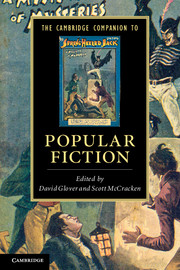Book contents
- Frontmatter
- Introduction
- 1 Publishing, history, genre
- 2 Fiction, theatre and early cinema
- 3 Television and serial fictions
- 4 The public sphere, popular culture and the true meaning of the zombie apocalypse
- 5 The reader of popular fiction
- 6 Reading time: popular fiction and the everyday
- 7 Gender and sexuality in popular fiction
- 8 Pulp sensations
- 9 Bestselling fiction: machinery, economy, excess
- 10 Comic books and graphic novels
- 11 Popular fiction in the digital age
- Further reading
- Index
- Cambridge Companions to …
11 - Popular fiction in the digital age
Published online by Cambridge University Press: 28 May 2012
- Frontmatter
- Introduction
- 1 Publishing, history, genre
- 2 Fiction, theatre and early cinema
- 3 Television and serial fictions
- 4 The public sphere, popular culture and the true meaning of the zombie apocalypse
- 5 The reader of popular fiction
- 6 Reading time: popular fiction and the everyday
- 7 Gender and sexuality in popular fiction
- 8 Pulp sensations
- 9 Bestselling fiction: machinery, economy, excess
- 10 Comic books and graphic novels
- 11 Popular fiction in the digital age
- Further reading
- Index
- Cambridge Companions to …
Summary
You are standing at the end of a road before a small brick building.
Around you is a forest. A small stream flows out of the building and down a gully.
Appearing on his computer screen at work one night, these words, the opening lines of the text adventure game Adventure, fill Jackdaw Acquerelli ‘with a great sense of well-being. Happiness flowed in its own small stream out of [his] chest and down into his typing digits.’ A computer programmer in Richard Powers's novel Plowing the Dark, Jackdaw is not the only person to have had this response. Adventure, created originally by Will Crowther around 1975 and modified by Don Woods in 1976, invited a whole generation to enter the digitally created world of caves, mazes, puzzles, story, gameplay and participatory culture that has indelibly altered our understanding of popular fiction. When the young Jackdaw first discovered the game he perceived it as a world of ‘pure potential’. Today, the world of digital popular fiction built on that potential is vast and constantly changing, a world without clear origins, definitions, or borders, with so many paths to follow, so many disparate artefacts and practices to collect and describe, that even the most intrepid critical explorer could easily get lost. In many ways there does not yet exist a defined field that would contain a ‘digital’ version of popular fiction; both the artefacts, or new fictional forms, and the critical tools defy traditional categories, crossing media and disciplines.
- Type
- Chapter
- Information
- The Cambridge Companion to Popular Fiction , pp. 196 - 213Publisher: Cambridge University PressPrint publication year: 2012

